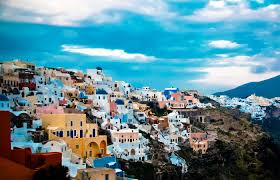When I think of Greece, the first thoughts that come to mind are Plato, Socrates, Aristotle, Archimedes, picturesque waters, Greek Gods/Goddesses, and to be perfectly honest -succulent lamb on a rotating spit! One of my absolute favorite things in the world. Although I have never had the opportunity to travel to Greece, I cannot wait to visit one day and explore the majestic beaches of Santorini, ancient ruins of Athens, and absorb all of the rich culture Greece has to offer.
My surname, Siracusa, is actually a Greek city-state in Sicily. My first name Dina derived from the Greek Name, Constantina-from the ruler Constantine. So, even though my family has always identified with our Sicilian/Italian roots, we probably have more Greek ancestors than anything else.
So, where do we even start with a country that has played such an integral in civilization as we know it? Let's start with the basics. Ancient Greece is where we found the foundations of Philosophy, Poetry, Government, Architecture, and Mathematics.
Ancient
Greece is considered by most historians to be the foundational culture of Western
Civilization. Greek culture was a powerful influence in the Roman Empire,
which carried a version of it to many parts of Europe. Ancient
Greek civilization has been immensely influential on the language, politics,
educational systems, philosophy, art and architecture of the modern world,
particularly during the Renaissance in Western Europe.
Citizens living in countries that employ democracy have Greece to thank, for Greeks pioneered beliefs in government by the people, trial by
jury, and equality under the law. The ancient Greeks pioneered in many fields
that rely on systematic thought, including biology, geometry, history, philosophy, and physics. They introduced
such important literary forms as epic and lyric poetry, history, tragedy, and
comedy. In their pursuit of order and proportion, the Greeks created an ideal
of beauty that strongly influenced Western art.
The cuisine of Greece is known throughout the world. It bears the fingerprints of many cultures that came into contact with Greece-Turkish, Roman, Middle Eastern. It was Archestratos
in 320 B.C. who wrote the first cookbook in history. Greece has a culinary
tradition of some 4,000 years. Ancient Greek cuisine was characterized by
its frugality and was founded on the "Mediterranean triad": wheat, olive oil,
and wine,
with meat being rarely eaten and fish being more common. This trend in Greek
diet continued in Roman and Ottoman times and changed only fairly recently when
technological progress has made meat more available.
The staples of many contemporary Greek dishes today still include the use of Olive Oil, Yogurt, Fish, Lamb, Cucumbers, Eggplant, grains, and herbs. I remember watching one of my favorite cooking shows, Anthony Bourdain's No Reservations, and marveling at the Greek episode where the average life expectancy of the people from the Island of Ikaria-a 99 sq. mile island in The Aegean Sea 30 miles west of Turkey was 95 years old. There are more healthy people on the planet here than any other place in the world.
What is their secret for longevity and health? They are insulated from all of the conveniences of fast food culture of modern society. This has helped them preserve customs and lifestyle habits that scientists believe explain their exceptional lifespan. The people of Ikaria consume mostly vegetables and beans that grow organically on the island, and little meat and sugar. They also consume large quantities of Extra Virgin Olive oil, goat milk-not cow's milk, wild greens that are rich in antioxidants, and healthy local herbal teas that are proven to lower blood pressure and risk of heart attacks. Makes a lot of sense to me!
This week we will cook a traditional vegetarian dish called Spanakorizo, which is a rice pilaf with Spinach, lemon and olive oil. We will serve it with Garides Saganaki-Prawns cooked in tomatoes, feta, ouzo, garlic, mint, and chilies. Cannot wait!










No comments:
Post a Comment